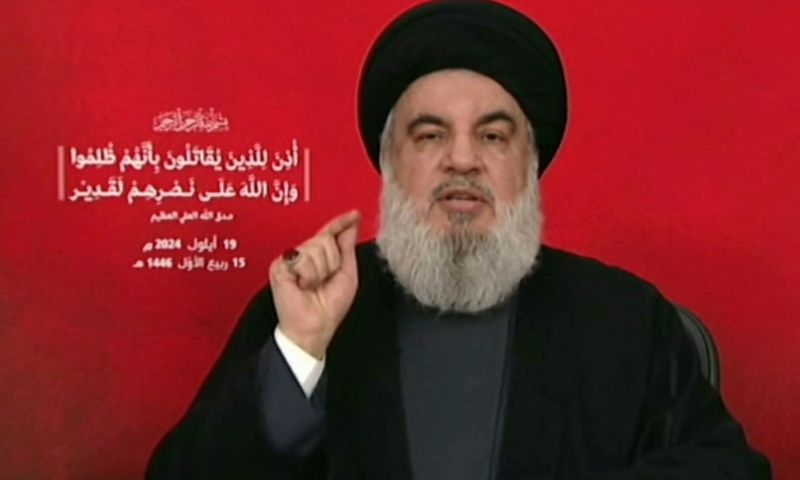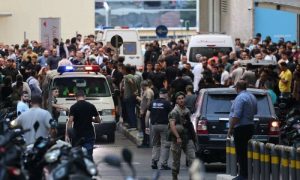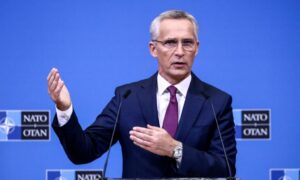BEIRUT: Lebanon’s powerful Hezbollah chief Hassan Nasrallah on Thursday warned that Israel will receive “just punishment” for the waves of communications device explosions that killed 37 people and injured nearly 3,000 over two days in Lebanon.
In his first speech since the device blasts, Hassan Nasrallah Israel will face “tough retribution and just punishment, where it expects it and where it does not.” He said that he would not give further details of the place, timing or nature of Hezbollah’s retaliation.
The blasts, which Hezbollah attributes to Israeli actions, struck amid escalating tensions in the region. Nasrallah described the incident as an “unprecedented” blow to his group, which has been engaged in ongoing conflicts with Israel. Nasrallah said that Hezbollah would retaliate against Israel, warning of “tough retribution”.
Labeling the explosions a “massacre” and a “war crime,” Nasrallah claimed that Israel intended to cause mass casualties, suggesting a desire to “kill no less than 5,000 people in two minutes.” He characterized the attacks as a possible “act of war”. He expressed Hezbollah’s readiness to escalate its military engagement.
In response to the device explosions, Nasrallah announced an internal investigation into the incident, as reports from experts and some Israeli media suggested involvement from Israel’s intelligence agency, Mossad.
Nasrallah also reiterated Hezbollah’s commitment to continue fighting until a ceasefire in Gaza is established, stating, “The Lebanese front will not stop until Israeli aggression on Gaza stops,” amid the ongoing violence and bloodshed.
During his speech, Nasrallah addressed Israeli officials’ claims that displaced Israelis could return to their homes, asserting, “You will not be able to return the people of the north to the north.” He said that the only way to facilitate the return of displaced residents would be to halt the violence in Gaza.
The violence along Israel’s northern border has intensified since October 7 Hamas’s attack on Israel. Israel has said it will widen the scope of its war in Gaza to include the Lebanon front.
Up until now, the focus of Israel’s firepower had been on Gaza. But Israel’s northern border with Lebanon has seen exchanges of fire between Israeli troops and Hezbollah fighters almost every day since October 8.
The violence has killed hundreds of people on the Lebanese side, and dozens on the Israeli side.
Israeli warplanes broke the sound barrier over Beirut as Nasrallah spoke, Lebanon’s state-run National News Agency said.
Israel launched airstrikes on Hezbollah strongholds in southern Lebanon on Thursday following two waves of communication device explosions across Lebanon.
Israel has not commented on the explosions in which Hezbollah operatives’ pagers and walkie-talkies exploded in supermarkets, on streets and at funerals. The blasts are believed to be unprecedented in their impact and scale, raising tensions in the region significantly.
The explosions occurred over two days, with devices hidden in pagers and walkie-talkies detonating in various locations, including supermarkets, streets, and even funerals. Hezbollah has accused Israel of orchestrating the attacks. The Lebanese group’s leader, Hassan Nasrallah, is expected to address the situation in a speech later today.
Israel has not officially commented on the blasts, but hours before the explosions on Wednesday its defence minister, Yoav Gallant, warned of a shift in military focus towards the north, stating, “The centre of gravity is moving northward. We are at the start of a new phase in the war.”
On Thursday, the Israeli military targeted six Hezbollah infrastructure sites and a weapons storage facility overnight, further escalating tensions. The strikes were confirmed by Lebanon’s National News Agency, which reported heavy shelling in several towns in the southern region.
Rattled by the deadly attacks that targeted its communication system, Hezbollah said Israel was “fully responsible for this criminal aggression” and vowed revenge. On Thursday, the group reported that 25 of its members were killed in the blasts, saying at least 20 had died when their walkie-talkies exploded.
Lebanon’s Foreign Minister, Abdallah Bou Habib, condemned the attacks as a blatant assault on the country’s sovereignty, warning that it could signal a broader regional war. Prime Minister Najib Mikati called on the United Nations to intervene against what he termed Israel’s “technological war.”
The international community is closely monitoring the situation. Iran’s envoy to the UN has said that Iran reserves the right to retaliate following the injuries sustained by its ambassador in Beirut during the explosions.
In the United States, National Security Council spokesman John Kirby cautioned against further military escalation, emphasizing that a solution to the ongoing crisis requires diplomacy, not additional operations. “We don’t believe that the way to solve where we’re at in this crisis is by additional military operations at all,” Kirby said.
Since October 7, Israel has launched a relentless bombardment campaign in Gaza killing at least 41,272 Palestinians, most of them civilians, according to data provided by the territory’s health ministry. The UN has acknowledged these figures as reliable.
Hospitals in Beirut struggled to manage the influx of casualties and medical professionals reported horrific injuries, with many victims suffering from severe shrapnel wounds and loss of limbs. Dr. Joelle Khadra noted that injuries were primarily to the eyes and hands, describing the situation as unprecedented.
Preliminary investigations in Lebanon have revealed that the devices used in the explosions were likely booby-trapped before reaching Hezbollah. A security official said that the pagers contained explosive materials designed to detonate upon activation, raising questions about the procurement and security of the devices.























